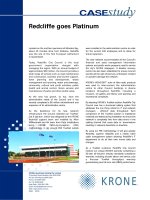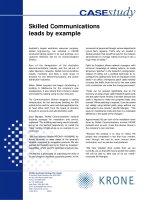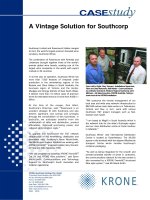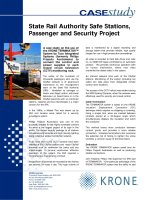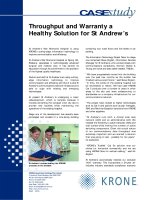Tài liệu Case study - PBE - Utah University pptx
Bạn đang xem bản rút gọn của tài liệu. Xem và tải ngay bản đầy đủ của tài liệu tại đây (280.32 KB, 4 trang )
MEETING TOMORROW’S INFRASTRUCTURE
NEEDS TODAY WITH ADC’S TRUENET
®
STRUCTURED CABLING SYSTEM
In the late 1800’s, settlers in Utah’s Cache Valley had a dream to bring
higher education and greater opportunity to the people of the then
rural area. With little more than simple pioneering spirit and
determination, they opened the doors of the Agricultural College of
Utah in 1888 to a handful of students. Now known as Utah State
University (USU), that same founding spirit lives on today in Logan,
Utah, where present day enrollment exceeds 22,000.
Utah State University has a long and decorated history of academic
excellence, with seven colleges offering 230 degrees and career
options, including 88 masters and 32 doctorate degrees. The once
diminutive college is now one of the nation’s most advanced
universities with numerous accolades ranging from more than 400
payloads sent into space (including more student designed experiments
than any other university) to being the 16th most productive scientific
research facility in the nation.
UTAH STATE UNIVERSITY
CASE STUDY
As a leader in technology academics, the entire
campus must have state of the art learning
facilities. In concert with the University Central
Administration, Telecommunications and
Telephone Services moved forward with infra-
structure upgrades to support new technologies
and applications. This unit of telecomm-
unications is part of the USU Office of Information
Technology Services, which is committed to
moving the institution to enhanced levels of
connectivity and functionality. From the original
Old Main Building of 1888, to the cutting edge
Engineering Building of 2003, the university now
boasts over 140 buildings with lecture hall
facilities wired for instant network access by all
students and faculty. To complicate the issue, the
university has a large distance-learning program
that makes up 28% of enrollment. To keep such
advanced programs and facilities moving, USU
required the most advanced communications
equipment available for high-speed data
transmission and storage. They realized early on
that everything begins with the structured
cabling system. The new Engineering Building,
commissioned in 2003, was determined to be
the ideal facility to begin the upgrade.
THE BOTTOM LINE IS
REMARKABLY SIMPLE
Scott Wells, a certified RCDD and Associate
Director of the Telecommunications Department,
has more than 30 years experience in data and
telecommunications. Wells knew the challenges
of supporting the new facility would require the
best equipment at every layer. As part of the
structured cabling selection process, USU tested
numerous solutions and balanced performance,
price, ease of installation and availability in their
decision making process. The only solution that
met all of USU’s strict criteria was the TrueNet
structured cabling system. “When you get the
best performance for the best price, the decision
becomes pretty easy,” stated Wells.
The university had planned to re-wire the campus
with three million feet of Enhanced Category 5
(Cat 5e) cable, because that’s all they believed
their budget would allow. “ADC came in with a
premier Category 6 system and said I could stay
on budget. I was obviously skeptical at first, and
collectively we had our doubts, but ADC really did
deliver.”
CASE STUDY
Scott Wells standing in the front
of the Edith Brown Building
The new engineering building was first
all KRONE installation on cumpus
Stephanie Roos, USU Telecommunications Technician
Once the TrueNet end-to-end system was
determined to be the best choice for the
university, the team sat down with ADC’s
technical design team to settle on the best
Category 6 (Cat 6) connectivity products for their
needs and applications. After careful consider-
ation of numerous options, the team selected the
Cat 6 HighBand
®
25 termination block for its
performance, density and versatility.
The HighBand 25 implements the legendary
LSA-PLUS
®
technology, incorporating corrosion
resistant silver-plated contacts set at a 45-degree
angle for unparalleled reliability. When hardwired,
the HighBand 25’s center patch port allows for
look both ways testing and the unique ability to
reroute circuits by simply inserting a patch cord.
This process, called patch-by-exception, allows
the user to reroute circuits quickly for temporary
transfer, and active testing without taking the
circuit down or inhibiting performance. If the
circuit is to remain, then it can be re-wired at any
time. To return it to its original status, the patch
cord is simply removed — instantly returning the
circuit to its original setting.
This system is ideal for end-of-semester main-
tenance when circuits can easily be returned to
their originally designed locale. It also equates to
a tremendous cost saving on patch cords,
because only 10-15 percent of the traditional
number of patch cords are ever implemented. The
end result is the cleanest, most polished, and
easiest to maintain telecommunications closet.
The rat’s nests of unnecessary patch cords are
gone and maintenance and record keeping are
suddenly simple. The entire telecommunications
staff at USU immediately took to the system.
“This type of versatility was simply not available in
other products. I love the TrueNet system and I
don’t ever want to go back to the 110 type
connectors we were using before,” said
Stephanie Roos, Telecommunications Technician.
HAVING IT ALL
For cable, USU chose AirES
®
cable technology.
AirES (Air Enhanced System) cable represents an
incredible breakthrough in cable technology. By
implementing numerous patent-pending designs
and manufacturing processes, engineers from the
former KRONE Group (now part of ADC) were
able to incorporate air channels into the design of
each conductor. The result is dramatically
improved dielectrics, which results in greater
transmission speed and performance. So extra-
ordinary was this improvement, it allowed the
conductor and insulation sizes to be reduced. The
end result is a better performing cable that is 32
percent smaller.
This reduction in size, and the incorporation of air
also means 32 percent less material, which
directly translates to a lower fuel load in all runs
and plenum spaces. In the event of a fire, the
AirES cable lowers the risk of flame propagation
and smoke generation, improving safety for
people, and highly sensitive, valuable electronic
equipment.
CASE STUDY
In some areas, the university has a tremendous
amount of three-quarter inch conduit and as a
result had extremely limited space for new cable
runs. It naturally concerned the team that the
cramped spaces wouldn’t allow for proper cable
lays and would effect bend radii and result in
compromised performance. As a result, they
concluded that they were going to need to run all
new conduit — an incredibly costly proposition.
But the AirES cable is capable of being placed
directly in the existing runs, saving the university
tens of thousands of dollars.
The telecommunications team instantly realized
the benefits of a smaller, faster and safer cable.
“We received samples from other vendors of their
Cat 6 cables with a filler and they were much
stiffer than the AirES cable,” said Wells. “AirES
cable even pulls better cold. The old Cat 5e we
were using was larger and stiffer than AirES Cat
6.” Combined with the HighBand 25 blocks,
Category 6 station outlets and AirES cable, the
entire end-to-end system is covered under the
TrueNet system warranty, guaranteed not to
create any transmission errors within the physical
layer (thanks to cable and connector components
designed in parallel and matched electrically) and
then proven with on-site active testing.
THE TRUENET DIFFERENCE
When prompted to point out what separated the
TrueNet system from the others, Wells replied,
“The major thing the TrueNet system did for us,
that no one else could, was the combination of
features that addressed all our needs, from the
small diameter of the cable to the superior
performance. It fit the bill for all of our issues.
“When we finished the evaluation it was the best
end-to-end cabling solution for all of our criteria.
The new Engineering Building was our very first
all-TrueNet application. We’ve since decided to
convert the entire campus over to a TrueNet end-
to-end solution. ADC has been the most
responsive manufacturer in the industry, carefully
listening to all the needs of their customers. That’s
the difference.”
FOR MORE INFORMATION
For more information on what sets the TrueNet
structured cabling system apart, please call
1.800.366.3891 or visit our web site at
www.adc.com/truenet
Utah State University
Telecommunications and Telephone Services
4420 Old Mail Hill
Logan, UT 84322-4420
Phone: 435.797.1276
web: www.usu.edu/cio
ADC Telecommunications, Inc., P.O. Box 1101, Minneapolis, Minnesota USA 55440-1101
Specifications published here are current as of the date of publication of this document. Because we are continuously
improving our products, ADC reserves the right to change specifications without prior notice. At any time, you
may verify product specifications by contacting our headquarters office in Minneapolis. ADC Telecommunications,
Inc. views its patent portfolio as an important corporate asset and vigorously enforces its patents. Products or
features contained herein may be covered by one or more U.S. or foreign patents. An Equal Opportunity Employer
1317417 3/05 Original © 2005 ADC Telecommunications, Inc. All Rights Reserved
Web Site: www.adc.com
From North America, Call Toll Free: 1-800-366-3891 • Outside of North America: +1-952-938-8080
Fax: +1-952-917-3237 • For a listing of ADC’s global sales office locations, please refer to our web site.
CASE STUDY




